Bariatric Surgery
Bariatric surgery includes all surgical techniques used to control obesity. Some restrict the stomach capacity, and others also modify some aspects of the digestion process.
Book a Consultation
We want to answer all your concerns and questions to help you achieve your weight loss goals.

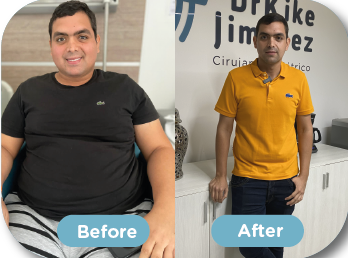
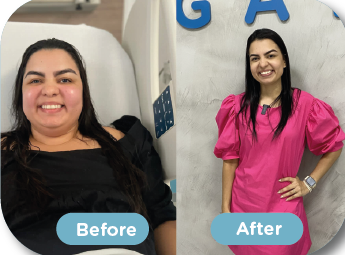


What is Bariatric Surgery?
Bariatric surgery is a minimally invasive surgical procedure that facilitates weight loss through changes in the patient’s digestive system. Some types of bariatric surgeries reduce the stomach size, making it easier for the patient to eat and drink less, thereby feeling satiated with smaller portions.
Other bariatric surgeries also modify the small intestine, which is the part of the body that absorbs calories and nutrients from foods and drinks. Bariatric surgery may be an option for patients who are obese (BMI greater than 30).
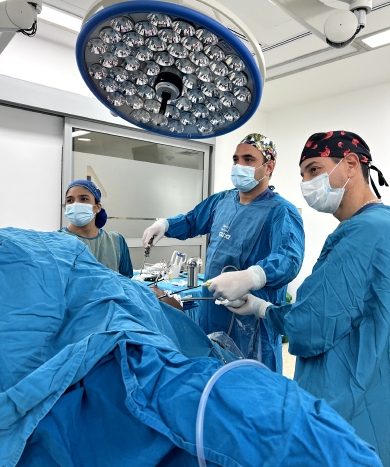
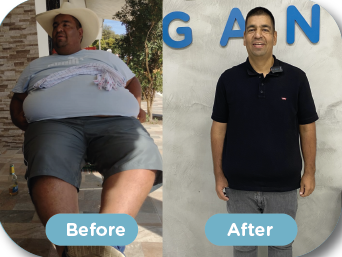
Who is a candidate for Bariatric Surgery?
The requirements for bariatric surgery are:
– Being obese, that is, presenting a BMI greater than 30 with or without comorbidities related to obesity.
– Bariatric surgery is an effective option for those who struggle with obesity and have failed to lose weight effectively with conventional methods such as diet and exercise.
– Comorbidities such as type II diabetes (T2DM), hypertension, sleep apnea, and other respiratory disorders, non-alcoholic fatty liver disease, osteoarthritis, lipid abnormalities, gastrointestinal disorders, or cardiac diseases are all parameters that are taken into account to define the type of procedure to be performed.
What types of bariatric surgery exist and which one is best for me?
To offer an effective solution to the different weight loss needs of patients and their varied health conditions, different techniques and methods have been developed to modify the digestive tract to generate a different and more convenient functioning of.
Among these methods, those that offer the best results are
Why choose us as your best choice for weight loss?

More than 15 years of experience

Conscious weight loss approach

Minimally invasive laparoscopic technique

Disposable surgical supplies “No reuse policy”

More than 4,000 successful surgeries
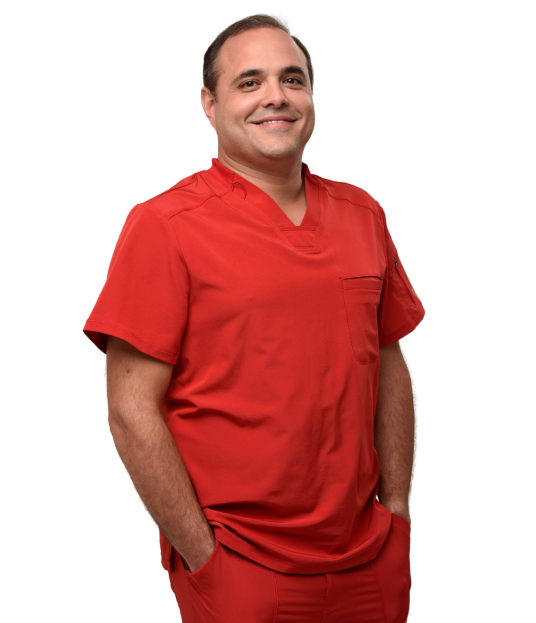
Discover a sincere and authentic approach to regaining your health.
During the consultation, Dr. Kike will analyze your condition, your needs, medical history and weight loss goals and in this way he and his team of professionals can indicate which procedure is ideal for you.
Your present does not have to be your future
What expectations should I have from bariatric surgery?
- One year after surgery you can expect a weight loss of between 70-90% of excess weight. This surgery requires the patient’s commitment to change habits and achieve successful and lasting results over time.
- If you suffer from any disease associated with obesity such as diabetes, hypertension, sleep apnea, among others, you can expect your condition to improve or remit completely.
- People considering bariatric surgery should first schedule a consultation with Dr. Kike to discuss their expectations for losing excess weight.
FAQ's

How does my diet change after bariatric surgery?
After surgery, your ability to eat large amounts of food will be limited. The postoperative diet will initially (During the first week) consist of liquids, then your diet will consist of solid foods, with some restrictions, such as carbohydrates. The aim is to boost your metabolism so that you have a tool to create better eating habits. Each meal plan varies depending on the patient, and is personalized according to your results and commitment to the process.
Will I need vitamin supplements after bariatric surgery?
Gastric Sleeve patients will not need supplements, so it is a restrictive surgery only. In the case of gastric bypass, you will need vitamin supplements, especially vitamins B12, D, and calcium, since surgery can affect your body’s ability to absorb certain nutrients from food.
How long does the recovery process take after bariatric surgery?
I always tell my patients, “You are undergoing surgery NOT sick” time in bed zero. In the clinic, you will be hospitalized for one night only. In two or three days, you will be able to be almost at 100% of your abilities. After 8 days you should start the cardiovascular exercise plan.
Let´s Talk!
+57 323 589 3507
info@kikejimenez.com
Address
Cl 1C #30-40 high park consultorio 221-222, Barranquilla, Colombia
